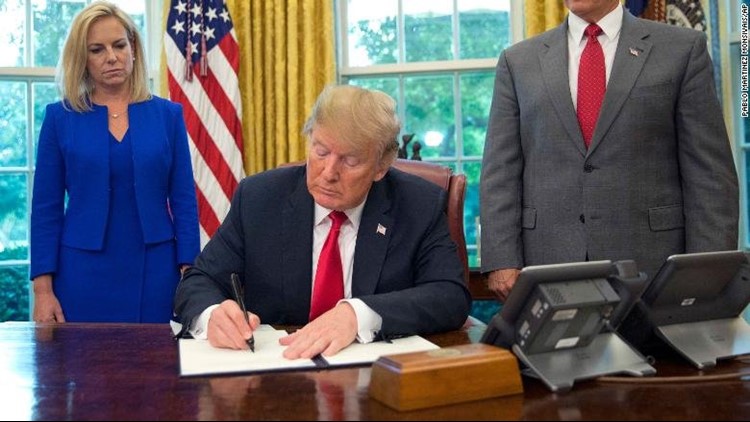WASHINGTON DC — After days of backlash over children getting separated from their parents on the southern border, President Donald Trump signed an executive order to detain families together as they attempt to enter the US illegally.
But it raises questions about where all the families will be housed and whether the at least 2,000 children separated from their relatives will be reunited.
While the President reversed course after days of digging in, finding a balance between enforcement of US immigration laws and maintaining family unity will lead to many unknowns.
Here’s what happens next:
Will the detentions continue?
Yes, those crossing the border illegally will still be detained. The executive order replaces family separation with family detention.
The executive order seeks more authority to detain families together until the end of their immigration proceedings.
It states that it is the policy of the administration “to maintain family unity,” a new position from an administration that previously defended the separation of families and said those affected put themselves in that position by crossing the border illegally.
Trump’s order asks that families be housed together “where appropriate and consistent with law and available resources.” It was not immediately clear whether the caveat means some separations will still happen.
Will the separated children be reunited?
The short answer is it’s too early to tell.
So far, the administration has not provided details on how it plans to unite the at least 2,000 children separated from their families.
The executive order does address the uniting of families already separated — and existing policies place the onus on parents to find their children in HHS custody and seek to reunite with them.
“For the minors currently in the unaccompanied alien children program, the sponsorship process will proceed as usual,” HHS spokesman Kenneth Wolfe said Wednesday.
Later Wednesday, the HHS’ families division’s spokesman said Wolfe “misspoke.” But he didn’t provide details on any plans to unite separated families.
“It is still very early and we are awaiting further guidance on the matter,” Brian Marriott said.
“Our focus is on continuing to provide quality services and care to the minors in HHS/ORR funded facilities and reunifying minors with a relative or appropriate sponsor as we have done since HHS inherited the program.”
John Sandweg, a former director of US Immigration and Customs Enforcement, said he was “really shocked” to see the executive order did not address the issue.
“I thought the whole point of this was to reunite the kids,” he said.
Who will detain the families?
The executive order announced a major chance on who will handle detentions.
Unlike in the past, adults will not be turned over to the Justice Department when they face criminal charges.
Instead, they’ll be under the custody of the Department of Homeland Security, a change the administration had previously said it could not do.
The order maintains an exception for when the child is at risk or there is concern the parent would pose a risk to the child’s welfare.
But there’s a catch that says the families will be detained to the “extent permitted by law and subject to the availability of appropriations” — again something that remains to be worked out.
Where will the families be held?
The order instructs federal agencies — especially the Defense Department — to prepare facilities to house the potentially thousands of families that will be detained.
There are currently far more beds for single adults in the government than for families. With thousands of families apprehended crossing the border illegally on average each month, detaining them could rapidly tax government resources.
“The secretary of Defense shall take all legally available measures to provide … existing facilities available for the housing and care of alien families, and shall construct such facilities if necessary and consistent with law,” Trump’s executive order says.
The military would have no responsibility for any of the activities, defense officials say. Officials compared it to being a ‘landlord’ but not responsible for the management of the housing, security, food services or other activities.
Will their cases be heard in court?
In the executive order, Trump makes an effort to have families’ cases decided faster in immigration courts.
Currently, if a family has a potentially valid claim of asylum, they could have an immigration court date months or years in the future, during which time they are allowed to live and work in the US.
In order to expedite the process for deporting the family or giving them legal status, Trump orders the Justice Department to “prioritize” cases “involving detained families” — presumably jumping them in line at immigration court and cutting down the time before a judge hears their case.



